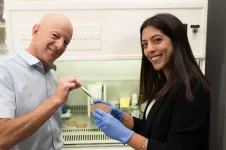Molecular tweezers that attack antibiotic resistant bacteria developed by Ben-Gurion U.
2021-05-10
(Press-News.org) BEER-SHEVA, Israel May 10, 2021 - Researchers from Ben-Gurion University (BGU), together with American and German colleagues, have developed new "molecular tweezers" to combat antibiotic-resistant bacteria. Their recently announced findings were published in Cell Chemical Biology.
For years, medical professionals have struggled with bacterial infections becoming increasingly resistant to antibiotics. These molecular tweezers may be the key to battling one of greatest public health issues of the 21st century.
"Our discovery prevents infection without building up antibiotic resistance, and it might even be preferable to develop treatments based on molecular tweezers rather than antibiotics," said BGU Department of Chemistry Prof. Raz Jelinek.
The research team, led by Prof. Jelinek and his Ph.D. student Ravit Malishev, tested their molecular tweezers on the Staphylococcus aureus (Staph) bacteria. In the U.S. staph infections have an estimated mortality rate of over 25%, and 40% for drug-resistant strains.
The tweezers target biofilm, a thin layer of fibers that protects the bacteria. By gripping the fibers and destroying the protective layer, the tweezers impair the bacteria without directly attacking it, which prevents resistance from occurring.
Prof. Jelinek, who is also BGUs vice president of Research & Development and a member of the Ilse Katz Institute for Nanoscale Science and Technology explained, "The tweezers are just like your home tweezers but a million times smaller, and instead of plucking hairs they attack fibers of the bacteria's biofilm." By doing that they break the biofilm, making it more vulnerable to human immune defenses and external substances that are used against bacteria like antibiotics."
"The success of the study indicates an innovative direction of antibiotic treatments against pathogenic bacteria. We found that binding the tweezers to the biofilm disrupts its protective capabilities. Consequently, the bacterial pathogens become, less virulent to the human body, and, more vulnerable to elimination by the immune system. This breakthrough may open up new ways to fight antibiotic-resistant bacteria." Prof. Jelinex hopes that following further testing, a pill containing millions of "swallowable tweezers" could identify biofilms in the body and break them apart.
INFORMATION:
Additional researchers include:
Orit Malka of BGU's Department of Chemistry; Dr. Sofiya Kolusheva of the BGU Ilse Katz Institute for Nanoscale Science and Technology; Nir Salinas and Prof. Meytal Landau of the Department of Biology, Technion-Israel Institute of Technology. Landau is also a member of the European Molecular Biology Laboratory (EMBL), in Hamburg, Germany. U.S. researchers include James Gibson, Angela Bailey Eden, and Prof. Chunyu Wang of the Center for Biotechnology and Interdisciplinary Studies, Department of Biological Sciences, Rensselaer Polytechnic Institute, Troy, New York; Gal Bitan of the David Geffen School of Medicine, Brain Research Institute, and Molecular Biology Institute, University of California, Los Angeles. Partners at the University of Duisburg-Essen in Essen include Ger Joel Mieres-Perez, Yasser B. Ruiz-Blanco, and Prof. Elsa Sanchez-Garcia of the Department of Computational Biochemistry; Prof. Frank-Gerrit Klärner and Prof. Thomas Schrader of the Faculty of Chemistry.
This research was supported by the German Research Foundation, the Boehringer Ingelheim Foundation, and NIH/NIA grants R01AG050721 and RF1AG054000.
About Americans for Ben-Gurion University
Americans for Ben-Gurion University plays a vital role in maintaining David Ben-Gurion's vision of an "Oxford in the Negev." By supporting a world-class academic institution that not only nurtures the Negev, but also shares its expertise locally and globally, Americans for Ben-Gurion University engages a community of Americans who are committed to improving the world. The Americans for Ben-Gurion University movement supports a 21st century unifying vision for Israel by rallying around BGU's remarkable work and role as an apolitical beacon of light in the Negev desert.
For more information visit http://www.americansforbgu.org.
[Attachments] See images for this press release:

ELSE PRESS RELEASES FROM THIS DATE:
2021-05-10
Bamboo cricket bats are stronger, offer a better 'sweet spot' and deliver more energy to the ball than those made from traditional willow, tests conducted by the University of Cambridge show. Bamboo could, the study argues, help cricket to expand faster in poorer parts of the world and make the sport more environmentally friendly.
"The sound of leather on willow" may have delighted cricket lovers for generations but the sport should now consider making the blades of its bats with bamboo, say researchers from Cambridge's Centre for Natural Material Innovation. ...
2021-05-10
A group of UK academics are calling for targets for mental health in order to meet the healthcare challenges of the next decade.
Published today in Journal of Mental Health researchers set out four overarching goals that will speed up implementation of mental health research and give a clear direction for researchers and funders to focus their efforts when it comes to better understanding the treatment of mental health.
The treatment of mental illness currently brings substantial costs to not only the NHS, but also to the individual and wider society, and the need for innovation to promote good mental health has never ...
2021-05-10
New research being presented at the European Congress on Obesity (ECO) held online this year, suggests that among girls a low body mass index (BMI) during childhood indicates a higher risk of developing anorexia nervosa as young adults, whereas a high BMI or overweight in childhood indicates a higher risk of bulimia nervosa.
"By examining the records of thousands of girls over their lifetime in national health registers, we have discovered early warning profiles that could signal girls at risk for anorexia nervosa and bulimia nervosa", says lead author Dr Britt Wang Jensen ...
2021-05-10
New research being presented at The European Congress on Obesity (ECO) held online this year, suggests that a measure of body shape should be used alongside body mass index (BMI) to help determine the risk of obesity-related cancers.
BMI is a simple way of measuring body fat from the weight and height of a person. But its reliability is often criticised, because it does not distinguish fat from muscle, or take into account where body fat is stored or an individual's sex or age. Similarly, waist circumference takes into account belly fat, which is linked to several health risks ...
2021-05-10
Obesity increases the risk of developing 10 of the most common cancers, regardless of how it is measured, according to a study of more than 400,000 adults in the UK, being presented at The European Congress on Obesity (ECO) held online this year, with central fatness (larger waist and hips) and general obesity (body mass index [BMI] and body fat percentage) associated with similar estimates of cancer risk.
The results suggest that BMI is an adequate measure of cancer risk from excess weight, and there is no advantage in using more complicated or expensive measures such as waist circumference or body fat percentage.
It is well known that being overweight or obese is linked to an elevated risk of some cancers and premature ...
2021-05-10
A study of more than 173,000 women in Denmark, presented at the European Congress on Obesity (ECO) held online this year, suggests that girls with a higher body mass index (BMI) during childhood are less likely than their peers with a lower BMI to develop breast cancer as adults, both before and after the menopause.
The findings contrast with those for adult BMI, which indicate that women who gain weight after menopause have an increased risk of postmenopausal breast cancer. While the authors are unsure why children with a higher BMI appear to be protected ...
2021-05-10
New research presented at this year's European Congress on Obesity (held online, 10-13 May) finds evidence that structures called inflammasomes (a part of the innate immune system that helps to regulate inflammation) could play an important role in the development of obesity-associated colon cancer. The study is by Dr Victoria Catalán and Professor Gema Frühbeck, University Hospital Navarra and CIBEROBN, Instituto de Salud Carlos III, Pamplona, Spain, and colleagues.
Inflammasomes* form part of the innate immune system which provides the first line of defence against pathogens using a wide range of physical, chemical, ...
2021-05-09
Researchers have successfully developed a new Strep A human challenge model, paving the way to test vaccines against the common deadly bacteria that causes sore throats, scarlet fever and skin sores.
The collaborative research effort, led by the Murdoch Children's Research Institute (MCRI) and published in The Lancet Microbe, found the model, which deliberately infected healthy adult volunteers with the bacteria in a controlled environment, was safe and would now be used to trial Strep A candidate vaccines.
Strep A infections affect about 750 million people and kill more than 500,000 globally every year - more than influenza, ...
2021-05-09
A complicated interaction between different proteins is needed for information to pass from one nerve cell to the next. Researchers at the Martin Luther University Halle-Wittenberg (MLU) have now managed to study this process in the synaptic vesicles, which play an important role in this process. The study appeared in the journal Nature Communications.
Several billion nerve cells communicate with each other in the body so that humans and other living beings can perceive and react to their environment. A host of complex chemical and electrical processes occur within a few milliseconds. "Special messenger substances - known as neurotransmitters - are released at the synapses of the nerve cells. They transmit information between the individual nerve cells," explains Dr Carla Schmidt, ...
2021-05-09
A study presented at this year's European Congress on Obesity (held online, 10-13 May) supports recommendations to avoid pregnancy for 12 months after bariatric (obesity) surgery due to an association with adverse outcomes in pregnancy including an elevated risk of preterm birth. The study is by Dr Laura Heusschen, Vitalys Obesity Clinic, part of Rijnstate Hospital, Arnhem, The Netherlands, and colleagues.
More than half of all female patients who undergo bariatric surgery are of reproductive age, and the resulting weight loss improves fertility, as well as reducing the risk of gestational diabetes and hypertensive disorders during pregnancy. It also ...
LAST 30 PRESS RELEASES:
[Press-News.org] Molecular tweezers that attack antibiotic resistant bacteria developed by Ben-Gurion U.

